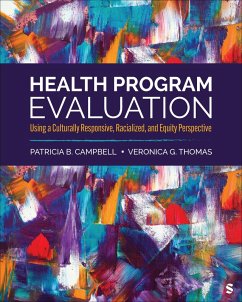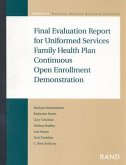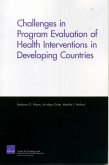Patricia B. Campbell, Veronica G. Thomas
Health Program Evaluation
Using a Culturally Responsive, Racialized, and Equity Perspective
Versandkostenfrei innerhalb Deutschlands
134,99 €
inkl. MwSt.
Versandkostenfrei*
Erscheint vorauss. 14. Juni 2026
Melden Sie sich
hier
hier
für den Produktalarm an, um über die Verfügbarkeit des Produkts informiert zu werden.

67 °P sammeln
Patricia B. Campbell, Veronica G. Thomas
Health Program Evaluation
Using a Culturally Responsive, Racialized, and Equity Perspective
- Broschiertes Buch
This timely textbook focuses on planning and implementing evaluation of public health programs through an equity-focused, socially just and racialized lens. While providing fundamental knowledge, tools, practical skills and theory, the authors challenge the dominant paradigm in planning implementing health evaluation programs, and the impact of power and privilege in evaluation. The text offers a wealth of topics not found in similar texts such as social determinants of health in program planning and evaluation, evaluation ethics in diverse cultural contexts, ethical issues surrounding…mehr
Andere Kunden interessierten sich auch für
![An Evaluation of the Food Safety Requirements of the Federal Purchase Ground Beef Program An Evaluation of the Food Safety Requirements of the Federal Purchase Ground Beef Program]() National Research CouncilAn Evaluation of the Food Safety Requirements of the Federal Purchase Ground Beef Program20,99 €
National Research CouncilAn Evaluation of the Food Safety Requirements of the Federal Purchase Ground Beef Program20,99 €![Adequacy of the Comprehensive Clinical Evaluation Program Adequacy of the Comprehensive Clinical Evaluation Program]() Institute Of MedicineAdequacy of the Comprehensive Clinical Evaluation Program28,99 €
Institute Of MedicineAdequacy of the Comprehensive Clinical Evaluation Program28,99 €![Research Literacy for Health and Community Practice, Second Edition Research Literacy for Health and Community Practice, Second Edition]() Sonya JakubecResearch Literacy for Health and Community Practice, Second Edition67,99 €
Sonya JakubecResearch Literacy for Health and Community Practice, Second Edition67,99 €![Cross-Agency Evaluation of DoD, VA, and HHS Mental Health Public Awareness Campaign Cross-Agency Evaluation of DoD, VA, and HHS Mental Health Public Awareness Campaign]() Joie D AcostaCross-Agency Evaluation of DoD, VA, and HHS Mental Health Public Awareness Campaign50,99 €
Joie D AcostaCross-Agency Evaluation of DoD, VA, and HHS Mental Health Public Awareness Campaign50,99 €![Final Evaluation Report for Uniformed Services Family Health Plan Continuous Open Enrollment Final Evaluation Report for Uniformed Services Family Health Plan Continuous Open Enrollment]() Michael SchoenbaumFinal Evaluation Report for Uniformed Services Family Health Plan Continuous Open Enrollment12,99 €
Michael SchoenbaumFinal Evaluation Report for Uniformed Services Family Health Plan Continuous Open Enrollment12,99 €![Challenges of Programs Evaluation of Health Interventions in Developing Countries Challenges of Programs Evaluation of Health Interventions in Developing Countries]() Barbara O WynnChallenges of Programs Evaluation of Health Interventions in Developing Countries19,99 €
Barbara O WynnChallenges of Programs Evaluation of Health Interventions in Developing Countries19,99 €![The Care Process: Assessment, Planning, Implementation and Evaluation in Health and Social Care The Care Process: Assessment, Planning, Implementation and Evaluation in Health and Social Care]() Sally HayesThe Care Process: Assessment, Planning, Implementation and Evaluation in Health and Social Care27,99 €
Sally HayesThe Care Process: Assessment, Planning, Implementation and Evaluation in Health and Social Care27,99 €-
-
-
This timely textbook focuses on planning and implementing evaluation of public health programs through an equity-focused, socially just and racialized lens. While providing fundamental knowledge, tools, practical skills and theory, the authors challenge the dominant paradigm in planning implementing health evaluation programs, and the impact of power and privilege in evaluation. The text offers a wealth of topics not found in similar texts such as social determinants of health in program planning and evaluation, evaluation ethics in diverse cultural contexts, ethical issues surrounding historical trauma, and the challenges of dealing with the politicalization of evaluation. Engaging features such as Case Studies, Perspectives from Groundbreakers, Reflect and Discuss questions, and Activities incorporate practical and applied opportunities for learning.
Produktdetails
- Produktdetails
- Verlag: Sage Publications Inc Ebooks
- Seitenzahl: 352
- Erscheinungstermin: 14. Juni 2026
- Englisch
- Abmessung: 254mm x 203mm
- ISBN-13: 9781071949443
- ISBN-10: 1071949446
- Artikelnr.: 75671182
- Herstellerkennzeichnung
- Libri GmbH
- Europaallee 1
- 36244 Bad Hersfeld
- gpsr@libri.de
- Verlag: Sage Publications Inc Ebooks
- Seitenzahl: 352
- Erscheinungstermin: 14. Juni 2026
- Englisch
- Abmessung: 254mm x 203mm
- ISBN-13: 9781071949443
- ISBN-10: 1071949446
- Artikelnr.: 75671182
- Herstellerkennzeichnung
- Libri GmbH
- Europaallee 1
- 36244 Bad Hersfeld
- gpsr@libri.de
Patricia B. Campbell, PhD, is the president of Campbell-Kibler Associates, Inc. She has been involved in research and evaluation with a focus on issues of race/ethnicity, gender, and disability for many years. Formerly an associate professor of research, measurement and statistics at Georgia State University, Dr. Campbell is an Association for Women in Science (AWIS) Fellow and was awarded the Willystine Goodsell Award by the American Educational Research Association (AERA) and the Betty Vetter Award by the Women in Engineering ProActive Network (WEPAN). Dr. Campbell has authored more than 120 publications including coauthoring, with Veronica Thomas, Evaluation in Today's World: Respecting Diversity, Improving Quality, and Promoting Usability. Her other publications include Building Evaluation Capacity: Guide I Designing A Cross Project Evaluation and Guide II Collecting and Using Data in Cross-Project Evaluations; A Framework for Evaluating Impacts of Informal Science Education Projects, Good Schools in Poor Neighborhoods: Defying Demographics; Achieving Success" and The AAUW Report: How Schools Shortchange Girls. Her current research interests focus on supports and barriers to biomedical researcher success, pathways to effective multidisciplinary research and the complexities of student engagement. Dr. Campbell's websites are www.BeyondRigor.org, which provides easy to use tips to improve the quality of evaluations with diverse populations, www.FairerScience.org which provides researcher and evaluators with tips and tools to more effectively communicate their diversity related research and evaluation findings to the media and the public and www.Campbell-Kibler.com, which provides free access to a number of her publications.
Preface
Acknowledgements
About The Authors
Chapter 1: Using Evaluation as a Tool to Improve Health Programs and Reduce
Health Disparities
Introduction
Overview of the Book's Focus, Framework and Structure
An Overview of Evaluation and Related Concepts
Evaluation Based on a Culturally Responsive, Racialized, and Social Justice
Framework
Rethinking Health and Health Disparity Program Evaluation
Mistrust in Health Care and Government
Chapter Reflection and Application
Supplemental Resources
Chapter 2: Bias, Discrimination, and Racism in Health and Health Programs:
Implications for Evaluation
Introduction
Defining Race and Ethnicity in the United States
Health Disparities, Health Inequities, and Health Equity
Health Disparities, Health Inequities, and Health Equity
Behind the Disparities
Behind the Disparities
Implications for Health Disparity Programs and their Evaluations
The Deficit Model
Medical Trust and Mistrust
Chapter Reflection and Application
Supplemental Resources
Chapter 3: Theories of Health Behaviors and Program Evaluation
Introduction
What is Theory and Why is it Important?
What is Theory and Why is it Important?
Major Theories of Health Behaviors and Outcomes
Major Theories of Health Behaviors and Outcomes
Major Theories of Health Behaviors and Outcomes
Major Theories of Health Behaviors and Outcomes
Chapter Reflection and Application
Supplemental Resources
Chapter 4: Culturally Responsive and Equity-Focused Health Program and
Evaluation Planning
Introduction
Importance of Needs Assessment in the Planning Process
Key Issues and Questions Prior to Health Program Planning
Integrating Health Program Planning and Evaluation Planning
Health Planning Models
Planning from a Culturally Responsive and Equity-Oriented Perspective
Faulty Assumptions During the Program and Evaluation Planning Process
Practical Steps in Health Program Planning and Evaluation Planning
Tools to Guide Program and Evaluation Planning
Chapter Reflection and Application
Supplemental Resources
Chapter 5: Ethics, Standards, and Social Justice Evaluation Approaches
Introduction
Ethics: Definition, Core Components, and Types
Critical Thinking and Ethics
Interplay Between Evaluation Ethics, Standards, and Social Justice
Conflicts of Interest in Health Evaluations
Culture, Ethics, and Evaluation
Ethical Principles, Program Evaluation Standards, and Social Justice
Evaluation Approaches with Ethical and Social Justice-Focus
Ethics and Social Justice Considerations in Using AI in Health Program
Evaluation
Chapter Reflection and Application
Supplemental Resources
Chapter 6: Engaging with Priority Populations and Communities in Health
Program Evaluations
Introduction
Engagement with Priority Populations: An Overview
Social Justice Foundations for Engaging with Priority Communities
The Value of Engagement and Examples Throughout the Evaluation Process
Using Engagement to Increase Cultural Understandings and Equity
Identifying Key Audiences for Engagement Activities
Continuum of Engagement for Different Purposes and Potential Results
Barriers to Engagement and Ways to Minimize Them
Chapter Reflection and Application
Supplemental Resources
Chapter 7: Asking Evaluative Questions to Understand Program Outcomes and
Advance Equity
Introduction
Distinguishing between Evaluation Questions and Research Questions
Learning About the Program and Its Context
Meaningful Evaluation Questions: Sources Beyond Project Goals
Mitigating Power Dynamics When Identifying Evaluation Questions
Characteristics of Good Evaluation Questions
Types of Evaluation Questions
AI and Generating Evaluation Questions
Crosswalk of Evaluation Questions with Project Goals and Logic Model
Chapter Reflection and Application
Supplemental Resources
Chapter 8: Selecting Measures and Collecting Data
Introduction
An Equity Based Framework for Selecting Measures and Collecting Data
Criteria Behind Selecting and/or Developing Measures
Using Existing Data
Using Existing Measures
Developing Measures for Health Program Evaluations
Data Collection
Building Trust
Response Rates and Hard-to-Reach Groups
Chapter Reflection and Application
Supplemental Resources
Chapter 9: Selecting and Using the Best Designs
Introduction
Evaluation Designs
Complex Evaluation Designs Adapted from Health Research and Clinical
Studies
Comparison and Control Groups
Rigor
Expanding Concepts of Rigor
Selecting An Evaluation Design
Chapter Reflection and Application
Supplemental Resources
Chapter 10: Analyzing Health Program Data
Introduction
Deductive and Inductive Reasoning
Analyzing Quantitative and Qualitative Data
Inferential Statistics and Statistical Significance
Qualitative Data Analysis
Intersectionality, Disaggregation and Data Analysis
Data Visualization
Using Artificial Intelligence (AI) in Data Analysis
Interpreting the Data
Chapter Reflection and Application
Supplemental Resources
Chapter 11: Reporting and Disseminating Evaluation Findings that are Usable
and Used
Introduction
Reporting Evaluation Results
Types of Evaluation Reports
Visual Representation of Data
Universal Design
Helping Audiences Engage with Evaluation Findings
Using Artificial Intelligence
Disseminating Results
Making Results Usable and Used
Chapter Reflection and Application
Supplemental Resources
Chapter 12: Moving Forward While Pushing Back
Introduction
The Framework
Cross-Cutting Themes Underlying the Framework
Defining Success
Benefits and Barriers of Engagement
Doing Evaluation in a Politicalized World
Chapter Reflection and Application
Supplemental Resources
Appendix A: American Evaluation Association Evaluators' Ethical Principles
Appendix B: Program Evaluation Standards
Appendix C: Culturally Responsive and Equity-Focused Evaluations of Public
Health Programs: Six Checklists
References
Acknowledgements
About The Authors
Chapter 1: Using Evaluation as a Tool to Improve Health Programs and Reduce
Health Disparities
Introduction
Overview of the Book's Focus, Framework and Structure
An Overview of Evaluation and Related Concepts
Evaluation Based on a Culturally Responsive, Racialized, and Social Justice
Framework
Rethinking Health and Health Disparity Program Evaluation
Mistrust in Health Care and Government
Chapter Reflection and Application
Supplemental Resources
Chapter 2: Bias, Discrimination, and Racism in Health and Health Programs:
Implications for Evaluation
Introduction
Defining Race and Ethnicity in the United States
Health Disparities, Health Inequities, and Health Equity
Health Disparities, Health Inequities, and Health Equity
Behind the Disparities
Behind the Disparities
Implications for Health Disparity Programs and their Evaluations
The Deficit Model
Medical Trust and Mistrust
Chapter Reflection and Application
Supplemental Resources
Chapter 3: Theories of Health Behaviors and Program Evaluation
Introduction
What is Theory and Why is it Important?
What is Theory and Why is it Important?
Major Theories of Health Behaviors and Outcomes
Major Theories of Health Behaviors and Outcomes
Major Theories of Health Behaviors and Outcomes
Major Theories of Health Behaviors and Outcomes
Chapter Reflection and Application
Supplemental Resources
Chapter 4: Culturally Responsive and Equity-Focused Health Program and
Evaluation Planning
Introduction
Importance of Needs Assessment in the Planning Process
Key Issues and Questions Prior to Health Program Planning
Integrating Health Program Planning and Evaluation Planning
Health Planning Models
Planning from a Culturally Responsive and Equity-Oriented Perspective
Faulty Assumptions During the Program and Evaluation Planning Process
Practical Steps in Health Program Planning and Evaluation Planning
Tools to Guide Program and Evaluation Planning
Chapter Reflection and Application
Supplemental Resources
Chapter 5: Ethics, Standards, and Social Justice Evaluation Approaches
Introduction
Ethics: Definition, Core Components, and Types
Critical Thinking and Ethics
Interplay Between Evaluation Ethics, Standards, and Social Justice
Conflicts of Interest in Health Evaluations
Culture, Ethics, and Evaluation
Ethical Principles, Program Evaluation Standards, and Social Justice
Evaluation Approaches with Ethical and Social Justice-Focus
Ethics and Social Justice Considerations in Using AI in Health Program
Evaluation
Chapter Reflection and Application
Supplemental Resources
Chapter 6: Engaging with Priority Populations and Communities in Health
Program Evaluations
Introduction
Engagement with Priority Populations: An Overview
Social Justice Foundations for Engaging with Priority Communities
The Value of Engagement and Examples Throughout the Evaluation Process
Using Engagement to Increase Cultural Understandings and Equity
Identifying Key Audiences for Engagement Activities
Continuum of Engagement for Different Purposes and Potential Results
Barriers to Engagement and Ways to Minimize Them
Chapter Reflection and Application
Supplemental Resources
Chapter 7: Asking Evaluative Questions to Understand Program Outcomes and
Advance Equity
Introduction
Distinguishing between Evaluation Questions and Research Questions
Learning About the Program and Its Context
Meaningful Evaluation Questions: Sources Beyond Project Goals
Mitigating Power Dynamics When Identifying Evaluation Questions
Characteristics of Good Evaluation Questions
Types of Evaluation Questions
AI and Generating Evaluation Questions
Crosswalk of Evaluation Questions with Project Goals and Logic Model
Chapter Reflection and Application
Supplemental Resources
Chapter 8: Selecting Measures and Collecting Data
Introduction
An Equity Based Framework for Selecting Measures and Collecting Data
Criteria Behind Selecting and/or Developing Measures
Using Existing Data
Using Existing Measures
Developing Measures for Health Program Evaluations
Data Collection
Building Trust
Response Rates and Hard-to-Reach Groups
Chapter Reflection and Application
Supplemental Resources
Chapter 9: Selecting and Using the Best Designs
Introduction
Evaluation Designs
Complex Evaluation Designs Adapted from Health Research and Clinical
Studies
Comparison and Control Groups
Rigor
Expanding Concepts of Rigor
Selecting An Evaluation Design
Chapter Reflection and Application
Supplemental Resources
Chapter 10: Analyzing Health Program Data
Introduction
Deductive and Inductive Reasoning
Analyzing Quantitative and Qualitative Data
Inferential Statistics and Statistical Significance
Qualitative Data Analysis
Intersectionality, Disaggregation and Data Analysis
Data Visualization
Using Artificial Intelligence (AI) in Data Analysis
Interpreting the Data
Chapter Reflection and Application
Supplemental Resources
Chapter 11: Reporting and Disseminating Evaluation Findings that are Usable
and Used
Introduction
Reporting Evaluation Results
Types of Evaluation Reports
Visual Representation of Data
Universal Design
Helping Audiences Engage with Evaluation Findings
Using Artificial Intelligence
Disseminating Results
Making Results Usable and Used
Chapter Reflection and Application
Supplemental Resources
Chapter 12: Moving Forward While Pushing Back
Introduction
The Framework
Cross-Cutting Themes Underlying the Framework
Defining Success
Benefits and Barriers of Engagement
Doing Evaluation in a Politicalized World
Chapter Reflection and Application
Supplemental Resources
Appendix A: American Evaluation Association Evaluators' Ethical Principles
Appendix B: Program Evaluation Standards
Appendix C: Culturally Responsive and Equity-Focused Evaluations of Public
Health Programs: Six Checklists
References
Preface
Acknowledgements
About The Authors
Chapter 1: Using Evaluation as a Tool to Improve Health Programs and Reduce
Health Disparities
Introduction
Overview of the Book's Focus, Framework and Structure
An Overview of Evaluation and Related Concepts
Evaluation Based on a Culturally Responsive, Racialized, and Social Justice
Framework
Rethinking Health and Health Disparity Program Evaluation
Mistrust in Health Care and Government
Chapter Reflection and Application
Supplemental Resources
Chapter 2: Bias, Discrimination, and Racism in Health and Health Programs:
Implications for Evaluation
Introduction
Defining Race and Ethnicity in the United States
Health Disparities, Health Inequities, and Health Equity
Health Disparities, Health Inequities, and Health Equity
Behind the Disparities
Behind the Disparities
Implications for Health Disparity Programs and their Evaluations
The Deficit Model
Medical Trust and Mistrust
Chapter Reflection and Application
Supplemental Resources
Chapter 3: Theories of Health Behaviors and Program Evaluation
Introduction
What is Theory and Why is it Important?
What is Theory and Why is it Important?
Major Theories of Health Behaviors and Outcomes
Major Theories of Health Behaviors and Outcomes
Major Theories of Health Behaviors and Outcomes
Major Theories of Health Behaviors and Outcomes
Chapter Reflection and Application
Supplemental Resources
Chapter 4: Culturally Responsive and Equity-Focused Health Program and
Evaluation Planning
Introduction
Importance of Needs Assessment in the Planning Process
Key Issues and Questions Prior to Health Program Planning
Integrating Health Program Planning and Evaluation Planning
Health Planning Models
Planning from a Culturally Responsive and Equity-Oriented Perspective
Faulty Assumptions During the Program and Evaluation Planning Process
Practical Steps in Health Program Planning and Evaluation Planning
Tools to Guide Program and Evaluation Planning
Chapter Reflection and Application
Supplemental Resources
Chapter 5: Ethics, Standards, and Social Justice Evaluation Approaches
Introduction
Ethics: Definition, Core Components, and Types
Critical Thinking and Ethics
Interplay Between Evaluation Ethics, Standards, and Social Justice
Conflicts of Interest in Health Evaluations
Culture, Ethics, and Evaluation
Ethical Principles, Program Evaluation Standards, and Social Justice
Evaluation Approaches with Ethical and Social Justice-Focus
Ethics and Social Justice Considerations in Using AI in Health Program
Evaluation
Chapter Reflection and Application
Supplemental Resources
Chapter 6: Engaging with Priority Populations and Communities in Health
Program Evaluations
Introduction
Engagement with Priority Populations: An Overview
Social Justice Foundations for Engaging with Priority Communities
The Value of Engagement and Examples Throughout the Evaluation Process
Using Engagement to Increase Cultural Understandings and Equity
Identifying Key Audiences for Engagement Activities
Continuum of Engagement for Different Purposes and Potential Results
Barriers to Engagement and Ways to Minimize Them
Chapter Reflection and Application
Supplemental Resources
Chapter 7: Asking Evaluative Questions to Understand Program Outcomes and
Advance Equity
Introduction
Distinguishing between Evaluation Questions and Research Questions
Learning About the Program and Its Context
Meaningful Evaluation Questions: Sources Beyond Project Goals
Mitigating Power Dynamics When Identifying Evaluation Questions
Characteristics of Good Evaluation Questions
Types of Evaluation Questions
AI and Generating Evaluation Questions
Crosswalk of Evaluation Questions with Project Goals and Logic Model
Chapter Reflection and Application
Supplemental Resources
Chapter 8: Selecting Measures and Collecting Data
Introduction
An Equity Based Framework for Selecting Measures and Collecting Data
Criteria Behind Selecting and/or Developing Measures
Using Existing Data
Using Existing Measures
Developing Measures for Health Program Evaluations
Data Collection
Building Trust
Response Rates and Hard-to-Reach Groups
Chapter Reflection and Application
Supplemental Resources
Chapter 9: Selecting and Using the Best Designs
Introduction
Evaluation Designs
Complex Evaluation Designs Adapted from Health Research and Clinical
Studies
Comparison and Control Groups
Rigor
Expanding Concepts of Rigor
Selecting An Evaluation Design
Chapter Reflection and Application
Supplemental Resources
Chapter 10: Analyzing Health Program Data
Introduction
Deductive and Inductive Reasoning
Analyzing Quantitative and Qualitative Data
Inferential Statistics and Statistical Significance
Qualitative Data Analysis
Intersectionality, Disaggregation and Data Analysis
Data Visualization
Using Artificial Intelligence (AI) in Data Analysis
Interpreting the Data
Chapter Reflection and Application
Supplemental Resources
Chapter 11: Reporting and Disseminating Evaluation Findings that are Usable
and Used
Introduction
Reporting Evaluation Results
Types of Evaluation Reports
Visual Representation of Data
Universal Design
Helping Audiences Engage with Evaluation Findings
Using Artificial Intelligence
Disseminating Results
Making Results Usable and Used
Chapter Reflection and Application
Supplemental Resources
Chapter 12: Moving Forward While Pushing Back
Introduction
The Framework
Cross-Cutting Themes Underlying the Framework
Defining Success
Benefits and Barriers of Engagement
Doing Evaluation in a Politicalized World
Chapter Reflection and Application
Supplemental Resources
Appendix A: American Evaluation Association Evaluators' Ethical Principles
Appendix B: Program Evaluation Standards
Appendix C: Culturally Responsive and Equity-Focused Evaluations of Public
Health Programs: Six Checklists
References
Acknowledgements
About The Authors
Chapter 1: Using Evaluation as a Tool to Improve Health Programs and Reduce
Health Disparities
Introduction
Overview of the Book's Focus, Framework and Structure
An Overview of Evaluation and Related Concepts
Evaluation Based on a Culturally Responsive, Racialized, and Social Justice
Framework
Rethinking Health and Health Disparity Program Evaluation
Mistrust in Health Care and Government
Chapter Reflection and Application
Supplemental Resources
Chapter 2: Bias, Discrimination, and Racism in Health and Health Programs:
Implications for Evaluation
Introduction
Defining Race and Ethnicity in the United States
Health Disparities, Health Inequities, and Health Equity
Health Disparities, Health Inequities, and Health Equity
Behind the Disparities
Behind the Disparities
Implications for Health Disparity Programs and their Evaluations
The Deficit Model
Medical Trust and Mistrust
Chapter Reflection and Application
Supplemental Resources
Chapter 3: Theories of Health Behaviors and Program Evaluation
Introduction
What is Theory and Why is it Important?
What is Theory and Why is it Important?
Major Theories of Health Behaviors and Outcomes
Major Theories of Health Behaviors and Outcomes
Major Theories of Health Behaviors and Outcomes
Major Theories of Health Behaviors and Outcomes
Chapter Reflection and Application
Supplemental Resources
Chapter 4: Culturally Responsive and Equity-Focused Health Program and
Evaluation Planning
Introduction
Importance of Needs Assessment in the Planning Process
Key Issues and Questions Prior to Health Program Planning
Integrating Health Program Planning and Evaluation Planning
Health Planning Models
Planning from a Culturally Responsive and Equity-Oriented Perspective
Faulty Assumptions During the Program and Evaluation Planning Process
Practical Steps in Health Program Planning and Evaluation Planning
Tools to Guide Program and Evaluation Planning
Chapter Reflection and Application
Supplemental Resources
Chapter 5: Ethics, Standards, and Social Justice Evaluation Approaches
Introduction
Ethics: Definition, Core Components, and Types
Critical Thinking and Ethics
Interplay Between Evaluation Ethics, Standards, and Social Justice
Conflicts of Interest in Health Evaluations
Culture, Ethics, and Evaluation
Ethical Principles, Program Evaluation Standards, and Social Justice
Evaluation Approaches with Ethical and Social Justice-Focus
Ethics and Social Justice Considerations in Using AI in Health Program
Evaluation
Chapter Reflection and Application
Supplemental Resources
Chapter 6: Engaging with Priority Populations and Communities in Health
Program Evaluations
Introduction
Engagement with Priority Populations: An Overview
Social Justice Foundations for Engaging with Priority Communities
The Value of Engagement and Examples Throughout the Evaluation Process
Using Engagement to Increase Cultural Understandings and Equity
Identifying Key Audiences for Engagement Activities
Continuum of Engagement for Different Purposes and Potential Results
Barriers to Engagement and Ways to Minimize Them
Chapter Reflection and Application
Supplemental Resources
Chapter 7: Asking Evaluative Questions to Understand Program Outcomes and
Advance Equity
Introduction
Distinguishing between Evaluation Questions and Research Questions
Learning About the Program and Its Context
Meaningful Evaluation Questions: Sources Beyond Project Goals
Mitigating Power Dynamics When Identifying Evaluation Questions
Characteristics of Good Evaluation Questions
Types of Evaluation Questions
AI and Generating Evaluation Questions
Crosswalk of Evaluation Questions with Project Goals and Logic Model
Chapter Reflection and Application
Supplemental Resources
Chapter 8: Selecting Measures and Collecting Data
Introduction
An Equity Based Framework for Selecting Measures and Collecting Data
Criteria Behind Selecting and/or Developing Measures
Using Existing Data
Using Existing Measures
Developing Measures for Health Program Evaluations
Data Collection
Building Trust
Response Rates and Hard-to-Reach Groups
Chapter Reflection and Application
Supplemental Resources
Chapter 9: Selecting and Using the Best Designs
Introduction
Evaluation Designs
Complex Evaluation Designs Adapted from Health Research and Clinical
Studies
Comparison and Control Groups
Rigor
Expanding Concepts of Rigor
Selecting An Evaluation Design
Chapter Reflection and Application
Supplemental Resources
Chapter 10: Analyzing Health Program Data
Introduction
Deductive and Inductive Reasoning
Analyzing Quantitative and Qualitative Data
Inferential Statistics and Statistical Significance
Qualitative Data Analysis
Intersectionality, Disaggregation and Data Analysis
Data Visualization
Using Artificial Intelligence (AI) in Data Analysis
Interpreting the Data
Chapter Reflection and Application
Supplemental Resources
Chapter 11: Reporting and Disseminating Evaluation Findings that are Usable
and Used
Introduction
Reporting Evaluation Results
Types of Evaluation Reports
Visual Representation of Data
Universal Design
Helping Audiences Engage with Evaluation Findings
Using Artificial Intelligence
Disseminating Results
Making Results Usable and Used
Chapter Reflection and Application
Supplemental Resources
Chapter 12: Moving Forward While Pushing Back
Introduction
The Framework
Cross-Cutting Themes Underlying the Framework
Defining Success
Benefits and Barriers of Engagement
Doing Evaluation in a Politicalized World
Chapter Reflection and Application
Supplemental Resources
Appendix A: American Evaluation Association Evaluators' Ethical Principles
Appendix B: Program Evaluation Standards
Appendix C: Culturally Responsive and Equity-Focused Evaluations of Public
Health Programs: Six Checklists
References







